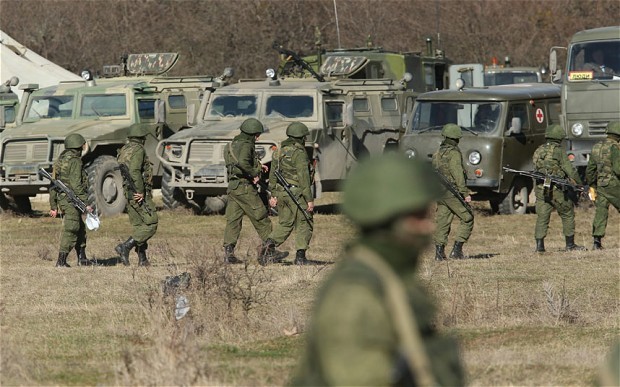(VOVworld) – With Ukraine’s crisis unsettled, the world has seen the EU and the US bristle over Russia’s decision to send troops to the Autonomous Republic of Crimea of Ukraine to protect Russian citizens. Political developments have undermined the relationship between Russia and the west ever since the cold war.
 |
Supposed Russian soldiers stand outside a Ukrainian military base in Crimea
Photo: Sean Gallup/Getty Images |
The UN Security Council, NATO, and the EU have convened a series of emergency meetings. The leaders of many western countries have had long telephone discussions with Russian President Putin.
West announces sanctions
EU’s High Representative for Foreign Affairs and Security Policy, Catherine Ashton, said the EU is considering sanctions such as suspending visa issuance. German Foreign Minister Frank Walter Steinmeier said if Russia does not make less belligerent gestures, it will have to suffer the consequences in its relations with the EU, implying the suspension of visas for Russian citizens, the suspension of negotiation for the Russia-EU Partnership and Cooperation Agreement, and the freezing of bank accounts of Russian officials.
In a 90-minute telephone conversation with President Putin, US President Barack Obama warned that Russia’s refusal to withdraw armed forces back to its bases in Crimea will have a negative impact on Russia’s reputation in the international arena. He added that Russia will be politically and economically isolated. Following the threat, Washington announced a halt in trade and investment negotiations with Moscow. The Pentagon said the US is terminating all military cooperation with Russia, including maneuvers and visits.
The US, Canada, the UK, and France announced they will suspend preparations for the G8 Summit in Sochi, Russia, in June.
NATO Secretary General Fogh Rasmussen said developments inside and outside Ukraine may put at risk NATO member countries bordering Ukraine and threaten the security and stability of Europe and the NATO alliance.
Tough reaction from Russia
President Putin said sending troops to the Crimea region is to protect Russian citizens from the nationalist extremists in Ukraine. Putin said Russia’s reaction is reasonable and intended only to stabilize the situation.
Russia said NATO’s criticism of Russia’s actions in Crimea will not help resolve Ukraine’s crisis. Russian Foreign Minister Sergei Lavrov strongly denounced the West’s threats to punish Russia.
Dialogue between nations is important
Senator Christopher Murphy, Chairman of the U.S. Senate Foreign Relations Subcommittee on Europe, said unilateral US sanctions will not be effective without cooperation from the EU. Former US Secretary of Defense Robert Gates warned President Obama to carefully consider all decisions on Russia. He said Mr. Obama will have a problem if the US allies in the EU just talk without acting. US Senator John McCain said boycotting the G8 summit in Russia is not a strong deterrence. Germany rejected the suggestion of removing Russia from the G8.
The US’s threat of financial sanctions on Russia will be hard to carry out. The EU will oppose it because they have close economic relations with Russia. Luxembourg Foreign Minister Jean Asselborn said 25% of the EU’s energy comes from Russia. Washington is unable to dismiss Russia from the Syrian issue or the issue of Iran’s nuclear program because of Russia’s important role internationally.
Observers say the crisis in Crimea will become a major sticking point between Russia and the West. The solution is not sanctions but frank and open dialogue.